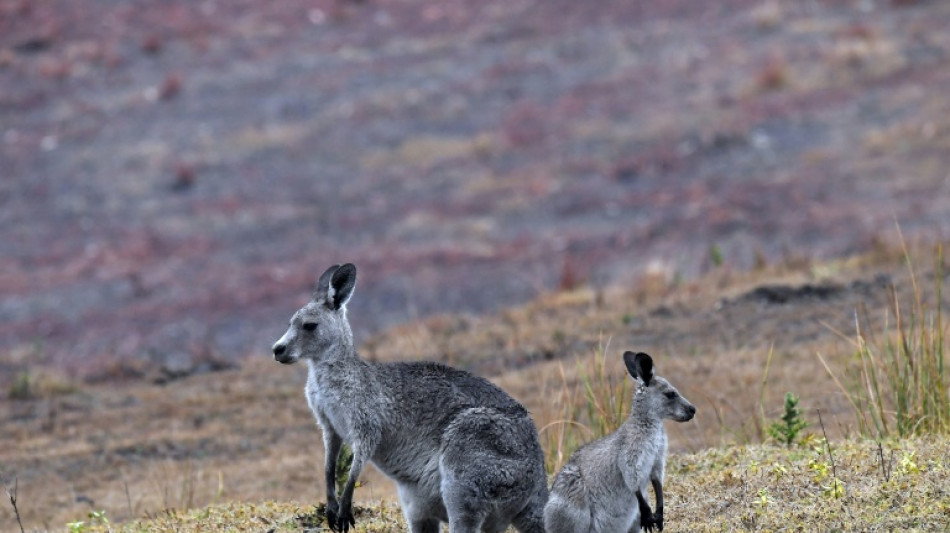
-
 Iran, US prepare for Oman talks after deadly protest crackdown
Iran, US prepare for Oman talks after deadly protest crackdown
-
Winter Olympics opening ceremony nears as virus disrupts ice hockey

-
 Mining giant Rio Tinto abandons Glencore merger bid
Mining giant Rio Tinto abandons Glencore merger bid
-
Davos forum opens probe into CEO Brende's Epstein links

-
 ECB warns of stronger euro impact, holds rates
ECB warns of stronger euro impact, holds rates
-
Famine spreading in Sudan's Darfur, warn UN-backed experts

-
 Lights back on in eastern Cuba after widespread blackout
Lights back on in eastern Cuba after widespread blackout
-
Russia, US agree to resume military contacts at Ukraine talks

-
 Greece aims to cut queues at ancient sites with new portal
Greece aims to cut queues at ancient sites with new portal
-
No time frame to get Palmer in 'perfect' shape - Rosenior

-
 Stocks fall as tech valuation fears stoke volatility
Stocks fall as tech valuation fears stoke volatility
-
US Olympic body backs LA28 leadership amid Wasserman scandal

-
 Gnabry extends Bayern Munich deal until 2028
Gnabry extends Bayern Munich deal until 2028
-
England captain Stokes suffers facial injury after being hit by ball

-
 Italy captain Lamaro amongst trio set for 50th caps against Scotland
Italy captain Lamaro amongst trio set for 50th caps against Scotland
-
Piastri plays down McLaren rivalry with champion Norris

-
 ECB holds interest rates as strong euro causes jitters
ECB holds interest rates as strong euro causes jitters
-
Spain, Portugal face floods and chaos after deadly new storm

-
 EU close to sealing trade deal with Australia
EU close to sealing trade deal with Australia
-
German Cup final to stay in Berlin until 2030

-
 What does Iran want from talks with the US?
What does Iran want from talks with the US?
-
Taming the lion: Olympians take on Bormio's terrifying Stelvio piste

-
 Wind turbine maker Vestas sees record revenue in 2025
Wind turbine maker Vestas sees record revenue in 2025
-
Italy's Casse tops second Olympic downhill training

-
 Anti-doping boss 'uncomfortable' with Valieva's coach at Olympics
Anti-doping boss 'uncomfortable' with Valieva's coach at Olympics
-
Bitcoin under $70,000 for first time since Trump's election

-
 'I am sorry,' embattled UK PM tells Epstein victims
'I am sorry,' embattled UK PM tells Epstein victims
-
England's Brook predicts record 300-plus scores at T20 World Cup

-
 Ukraine, Russia swap prisoners, US says 'work remains' to end war
Ukraine, Russia swap prisoners, US says 'work remains' to end war
-
Wales' Rees-Zammit at full-back for Six Nations return against England

-
 Sad horses and Draco Malfoy: China's unexpected Lunar New Year trends
Sad horses and Draco Malfoy: China's unexpected Lunar New Year trends
-
Hong Kong students dissolve pro-democracy group under 'severe' pressure

-
 Germany claws back 59 mn euros from Amazon over price controls
Germany claws back 59 mn euros from Amazon over price controls
-
Germany claws back 70 mn euros from Amazon over price controls

-
 VW and Stellantis urge help to keep carmaking in Europe
VW and Stellantis urge help to keep carmaking in Europe
-
Stock markets drop amid tech concerns before rate calls

-
 BBVA posts record profit after failed Sabadell takeover
BBVA posts record profit after failed Sabadell takeover
-
UN human rights agency in 'survival mode': chief

-
 Greenpeace slams fossil fuel sponsors for Winter Olympics
Greenpeace slams fossil fuel sponsors for Winter Olympics
-
Greenpeace slams fossel fuel sponsors for Winter Olympics

-
 Kinghorn, Van der Merwe dropped by Scotland for Six Nations opener
Kinghorn, Van der Merwe dropped by Scotland for Six Nations opener
-
Russia says thwarted smuggling of giant meteorite to UK

-
 Salt war heats up in ice-glazed Berlin
Salt war heats up in ice-glazed Berlin
-
Liverpool in 'good place' for years to come, says Slot

-
 Heathrow still Europe's busiest airport, but Istanbul gaining fast
Heathrow still Europe's busiest airport, but Istanbul gaining fast
-
Highest storm alert lifted in Spain, one woman missing

-
 Shell profits climb despite falling oil prices
Shell profits climb despite falling oil prices
-
Pakistan will seek govt nod in potential India T20 finals clash

-
 China shuns calls to enter nuclear talks after US-Russia treaty lapses
China shuns calls to enter nuclear talks after US-Russia treaty lapses
-
German factory orders rise at fastest rate in 2 years in December

| SCS | 0.12% | 16.14 | $ | |
| BP | -2.93% | 38.085 | $ | |
| NGG | -1.02% | 86.905 | $ | |
| CMSD | 0.17% | 23.91 | $ | |
| BTI | 0.08% | 61.68 | $ | |
| RIO | -4.49% | 92.33 | $ | |
| RBGPF | 0.12% | 82.5 | $ | |
| GSK | 3.34% | 59.21 | $ | |
| RYCEF | -0.36% | 16.62 | $ | |
| AZN | 1.06% | 189.46 | $ | |
| CMSC | -0.15% | 23.485 | $ | |
| BCE | -2.85% | 25.61 | $ | |
| BCC | -0.92% | 89.41 | $ | |
| JRI | 1.46% | 13.345 | $ | |
| VOD | -6.47% | 14.755 | $ | |
| RELX | 2.36% | 30.5 | $ |

Australia told to shoot kangaroos before they starve
Australia's kangaroos could die in "catastrophic" numbers if a population boom is left unchecked, ecologists have warned, while backing the industrial-scale culling of the marsupials.
To outsiders, the kangaroo is an instantly-recognisable symbol of the Australian wilderness, but within the country the native animal poses a major environmental headache.
Kangaroos have a "boom and bust" population cycle -- when fodder is plentiful on the back of a good wet season their numbers can balloon by tens of millions.
Hopping mobs of kangaroos can rapidly strip paddocks bare, but ecologist Katherine Moseby warned they would starve to death in droves when food ran out.
"The last drought we estimated that 80 or 90 percent of the kangaroos in some areas died," she told AFP.
"They are starving to death -- going into public toilets and eating toilet paper, or lying on the road starving while their joeys are trying to feed," she added, referring to events from the last population boom.
Moseby said the kindest way to save kangaroos from this fate was to shoot them, and harvest the meat, as a way of keeping numbers in check.
"It keeps the numbers down so that when we do get drought we don't get these welfare issues," she said.
"If we saw them as a resource and managed them like that, we wouldn't get the catastrophic deaths that we see."
Kangaroos are protected in Australia but the most common species are not endangered -- this means they can be shot and killed in most jurisdictions, but government permission is needed.
Each year, as many as five million kangaroos are shot as part of a homegrown industry, which harvests their carcasses for meat, pet food and leather.
Dennis King from the Kangaroo Industry Association of Australia believes the country is on the cusp of another kangaroo boom.
"After three years of La Nina right down the east coast, we've seen the perfect growth scenario for kangaroos over the next couple of years," he told AFP.
"The breeding cycle really speeds up."
King said the national kangaroo population fell under 30 million following a crippling drought in the early 2000s, but could soon rebound to as many as 60 million.
- 'Cruel slaughter' -
Animal rights activists have denounced the commercial cull as a "cruel slaughter", pressuring global sportswear giants such as Nike and Puma to phase out the use of kangaroo leather.
"Nike divested of its only kangaroo leather supplier in 2021 and will stop making any product with kangaroo leather in 2023," a spokeswoman for the company said in March.
Politicians in Oregon, where Nike was founded, introduced a bill earlier this year that would outlaw the use of "any part of a dead kangaroo".
"These native animals are slaughtered for the sake of commercial profit," Animals Australia said earlier this year.
George Wilson, a leading researcher on kangaroo management, said attempts to shut down the industry were well-intentioned but ultimately misguided.
"They say it's unethical, but it's unethical to let them starve to death," he told AFP.
"The cruelty is not doing anything about it."
Moseby agreed, saying ending the culling of kangaroos would actually be more cruel in the long run.
"Trying to stop the harvest of leather or meat, it's not going to have any welfare benefit," she said.
"It's going to make it worse."
I.Saadi--SF-PST
